|
One late evening on a camping trip in 3rd grade, my dad and a family friend, Mr. Stroude, took my Girl Scout troop out on a nature walk. We weaved along the path through the woods, giggling with our flashlights dancing around the dirt and moss and trees, until the adults stopped us and asked us to turn off our flashlights. As our eyes adjusted, we realized that we had neared the beginning of a long floating bridge across a large marsh. I say “the beginning” because the length of the crossing and the darkness of the Indiana country meant that, even with my 20/20 vision, I could only see to about the middle of the bridge.
Mr. Stroude proceeded to walk out onto the bridge and soon melted away into the darkness at its center. My dad then explained to us that if we wanted to continue, we would have to walk across the bridge individually, without our flashlight, and meet Mr. Stroude on the other side. “WHAT?!?” More than a little terrifying, Dad! I wasn’t alone in that sentiment. All of us were frightened of the potentially infinite (but definitely creaking) bridge and the murky water beneath it, but no one really wanted to turn back when others might go on without her and see wonderful sights. Eventually, I mustered my courage and stepped out over the marsh into the darkness. I am about to step out onto another bridge, the end of which is covered in darkness. I will soon finish my two years in the Echo program through Notre Dame, and I cannot yet see where God is asking me to go. I cannot see whether I will pass the comprehensive exams for my master’s degree at the end of the summer. I cannot see whether I will have a job come the fall, or even what kind of job may present itself. I cannot see where marriage fits into my future. I cannot see how my relationships will hold up when I move to a new city and leave this community behind. As I pondered all these unknowns, this story from my memory and this prayer from Thomas Merton kept coming forward: My Lord God, I have no idea where I am going. I do not see the road ahead of me. I cannot know for certain where it will end. Nor do I really know myself, and the fact that I think that I am following your will does not mean that I am actually doing so. But I believe that the desire to please you does in fact please you. And I hope I have that desire in all that I am doing. I hope that I will never do anything apart from that desire. And I know that if I do this, you will lead me by the right road though I may know nothing about it. Therefore will I trust you always though I may seem to be lost and in the shadow of death. I will not fear, for you are ever with me, and you will never leave me to face my perils alone. The process of crossing these bridges was and will be a matter of trust. I trusted that my dad would not have asked me to walk a bridge that would not hold me, and I had to recall that trust with each ominous creak. I will trust that Christ is doing the same. I trusted that Mr. Stroude had walked the bridge before me and had already confronted the fears inherent in doing so, and was waiting on the other side, even if I could not see him. I will trust that Christ is doing the same. Of course, I found that each time I reached the darkest part of the bridge, it was no longer completely dark, and there were at least a few more steps to see - enough to allow me to keep walking. I will trust that Christ will show me enough of what’s next to let me keep moving towards Him. Laura Berlage serves as an Echo Faith Formation Apprentice in the Diocese of Camden, NJ... for now.
0 Comments
There are many places in life where we find joy. Often times, I find joy in my family – going home for holidays and being with the people that I love the most. I find joy in my friends – a second family that arguably knows me best. I find joy in my work – encouraging others to support an institution that means so much to not only me, but also to the Church in the United States.
When I think of my Catholic faith, I can only think of joy. This was especially evident during the recent election of a new Pope when I saw the entire world rest its eyes on our Church. It gave me great joy to answer people’s questions about my faith, help them to learn more about what it means to be Catholic, and strengthen my own faith. Joy in our faith can be found in a variety of different contexts. The one place where I find the most obvious joy, however, is within the hymns and songs of praise that are sung so beautifully in churches throughout the world. Over this past Triduum and Easter Sunday I heard magnificent music that brought people to tears.. One thing which astounds me every time I attend Mass is that it doesn’t matter if you can sing or not – liturgical music is meant to be sung by anyone. The entire congregation is meant to join in and sing their praise to God. You can see visually the people around you either belting their notes or perhaps listening intently to those around them. Whichever way one chooses to participate, there is no doubt that you can find Joy within the music both sung and played. One of the things I like to do immediately upon entering a pew is to figure out what hymns are going to be sung as the processional and recessional. If I don’t know the hymns, I try to hum the notes to myself in an effort to learn before the music starts. When the organist starts playing, I am transported – if only for a few brief moments – to a place of Joy. The people singing around me are all focused on one thing: praising God, saying thank you for giving us this day, and joining together to start off their week on the right foot. As I was writing this post, I stopped to go to Mass in downtown Washington, DC. Again, the music chosen immediately brought me into the moment. Each liturgical season brings with it an amazing group of hymns. Everyone I’ve spoken to have their favorites, especially at Christmastime. As for me, I’m a sucker for Easter hymns. Whatever the case may be, liturgical music has a way of bringing us closer to God in so many ways. Next time you’re at Mass, take it in – notice that everyone around you is all focused on the same thing: praising God and thanking him for giving us this day. What’s my favorite hymn? Too many to choose from, but I’ll leave you with this beautiful piece of music that I think anyone can appreciate – especially when you least expect it. Chris Pierno is the Associate for Media and Marketing for the Catholic Apostolate Center.  Pope Gelasius (d. AD 496) said of St. George that he is one of the saints "whose names are rightly reverenced among us, but whose actions are known only to God." Little can be verified about the life of St. George. He is remembered as a martyr for the faith, and claimed as a patron by thirteen European countries. His intercession is sought constantly on behalf of soldiers and farm workers (and those suffering from the plague, though luckily with less frequency as of late). St. George is best remembered for his defeating a dragon to rescue the fair maiden (which naturally makes him a favorite of this fairy-tale loving girl). The beast attacked a quiet little kingdom, and his hunger demanded hefty payment, leading up to the necessary sacrifice of the king’s own daughter. Just as the dragon is about to devour the princess, St. George rides by, conveniently enough, and after making the sign of the cross and proclaiming the name of Jesus, he defeats the dragon. In thanks, the entire kingdom is baptized. The end. [1] But clearly it's not the end, because this myth has been a favorite for 1500 years. So what can a 3rd century saint, whose life and deeds are wrapped in myth and legend, tell us about being a Christian in the 21st century? Like in so many other tales and stories, the facts are less important than the message they bring. In this case, we learn that dragons are indeed real. Sometimes they are obvious and obtrusive, demanding immediate attention, like road rage or constantly breaking into conversations with “Well, in my opinion.” Often, however, they emerge in the form of redundancy, mediocrity, boredom, or the benign. What do we do about these sneaky, shadow dragons which creep into our lives in the form of a snooze button or accidental rude comments? These dragons grow slowly in the secret and dark where nobody can see them and think poorly of me. This tale also reminds us that courage takes many forms. Often, courage is speaking out in defense of the faith in the face of blatant injustice, as is still seen in too many places in the world. For my life today, courage takes the form of remaining steadfast in seemingly benign moments, like laundry and emails. My challenge is to remain dutiful and prayerful while I wait. For this twenty-something, courage is taking the waiting as seriously as what I am waiting for. I wait to finish my Masters; wait until I get married; wait to move closer to my family; wait for a job. Lately I have been praying for a heart like Mary's, courageous in all matters, great and small. She allowed God to break into her quiet life, and then she waited for her Son to be born, waited to find him in the Temple, waited for the Resurrection. As the psalmist says, “Wait for the Lord, take courage; be stouthearted, wait for the Lord” (Ps. 27:14). I recently stumbled upon an icon of St. George which I bought for my fiancé. It is currently hanging in his bedroom, and in less than four months will hang in ours. I love to see it when I visit, because George’s story is one I can relate to. For, as G.K. Chesterton once wrote: “Fairy tales are not important because they tell us that dragons exist, but because they tell us that dragons can be beaten.” St. George, pray for us that we may develop courageous hearts to maintain our faithfulness to Christ in small moments and defeat the less obvious dragons in our lives. Abigail Craycraft is an apprentice with the Echo Program through the University of Notre Dame where she is currently serving at Bl. Teresa of Calcutta Parish in Collingswood, NJ.
“God is preparing a new dwelling place and a new earth where justice will abide”
–Gaudium et Spes, 39 Pablo Picasso "Dove of Peace" As I was growing up in a small seaside town north of Boston, I never once said, “I want to be a social worker someday.” Yet, here I am, one month shy of a Master of Social Work degree from Boston College. Like many other professional degree curricula, all accredited social work degree programs require significant fieldwork. My field education gave me the opportunity to work as a Legislative Advocacy intern with the Massachusetts Coalition for the Homeless. My projects have included significant outreach to drop-in centers and shelters for young adults experiencing homelessness in the Commonwealth of Massachusetts. As a young Catholic woman educated in human service design, delivery, and evaluation, I typically approach social problems with an eye of strategy, compassion, and determination. For the first time in my early career I have, however, added a layer of personal connection and relevance to my work. Not only are the groups that I am working with brothers and sisters of the greater universal family, but also they are my peers. Most of the young adults I have worked with this year balance schedules similar to my own, including school, relationships, work, high transportation costs, and family frustrations. The biggest difference between me and my peers that I met during this project is that these are young adults unaccompanied by a guardian or parent and experiencing homelessness. My responsibilities while performing outreach work and legislative advocacy has included visiting drop-in centers and shelters for young adults to encourage them to share their story in order to call for more action to support them. The young adults I work with are between the ages of 14 and 24 years old and many have experienced inconsistent and insufficient housing for their entire lives. Thousands of young people in Massachusetts alone are experiencing homelessness as they sleep on couches, in parks, under bridges, in emergency rooms, in shelters, and in one case, behind a dumpster near a restaurant, because it was warm. Many of them have shared their experiences with me. In these sessions as we channel experience into testimonies, my peers, my friends, my inspirers, whatever you call them, they have opened their souls to me. Many of them have experienced such degrees of physical and emotional abuse through neglect, sexual assault, and violence. Some have grown up watching their parents sell and use illicit drugs and alcohol. More than a third of the population has been abandoned or abused specifically because of their identification as gay, lesbian, bisexual, or transgendered. Many have participated in risky sexual behavior and drug trafficking as a means to get a “safe” space to sleep for the night or something to eat that day. Even more are supporting younger siblings, finding ways to use any money they make to buy necessities for their siblings. In their 1986 Pastoral Letter on Catholic Social Teaching the US Bishops write; “In pursuit of concrete solutions, all members of the Christian community are called to an ever finer discernment of the hurts and opportunities in the world around them, in order to respond to the most pressing needs and thus build up a more just society” (126). As a Catholic woman concerned with building the Kingdom of God through fighting for a better and more equitable world, I am passionate because my peers, the thousands of unaccompanied youth in Massachusetts, are fighters. Most of the young people I met with are attending community college; they balance class schedules with their shelter schedules. They work tirelessly at minimum wage jobs to support their younger siblings. They have found new families in their fellow youth experiencing homelessness. What stays with me is the amazing resilience of the human spirit. In each of these encounters with my peers we laughed and joked and even with the moments of anxiety, angst, and sadness there was a spirit of Hope. Pope Francis in his Homily for Palm Sunday tells us, “Please do not let yourselves be robbed of hope! Do not let hope be stolen! The hope that Jesus gives us.” These brother and sisters that I met, even in the midst of immense struggle and abandonment have not given up, have not let their hope be stolen. Because of their witness I will continue to fight for a more just society until it is that we dwell in the place God created where justice abides (Gaudem et Spes, 39). Led by the Holy See and our Holy Father Pope Francis, let us come together to care first for our neediest and preserve in our diligence to serve! Samantha Alves is working toward a M.S.W. at Boston College and currently works for the Massachusetts Coalition for the Homeless. Our Church breathes through the two lungs of Scripture and Tradition, and as members of the Church we are called to do the same to live a flourishing life. The Catechism of our Church explains the importance of Scripture saying, "And such is the force and power of the Word of God that it can serve the Church as her support and vigor, and the children of the Church as strength for their faith, food for the soul, and a pure and lasting fount of spiritual life" (CCC 131). In order to inspire a life of apostolic vocation with strength and vigor, we begin today our first installment of the "Scripture to Life" series. Through the intercession and example of Our Lady, Mother of God and Queen of Apostles, we hope that the Word of God may be enfleshed by you.
Throughout my spiritual journey I have always struggled with pinpointing the virtue of humility in my life. I don’t think this is due to any lack of desire for the virtue, (it usually isn’t) but rather a lack of true understanding of the virtue. In the Gospel passage of John 13, Jesus washes the feet of his disciples and as he approached, Peter asked, “Master, are you going to wash my feet?” Whenever I read this passage, I always anticipate what Peter says next: “You will never wash my feet!” For some reason, I am always drawn to Peter’s stark rejection of Jesus’ perfect example of humility. If you have practiced lectio divina before, you know that when a part of Scripture confuses the heck out of you, that is exactly the point where you must stop reading, close your eyes, and listen.; It is specifically in this moment that God seeks to transform you through the power of his living word. My meditation on this passage continues with reflecting on exactly what was going through Peter’s mind and heart at the moment of his objection: confusion and feelings of extreme discomfort. It is as if Peter, like many of us who strive for, yet lack the fullness of this most necessary virtue of humility, is saying: WAIT! I don’t understand! Why are you asking me to go this far outside of my “comfort zone” in order to be your disciple? One of the ways I ask my students to relate to Peter’s level of discomfort is by asking them to consider allowing me to wash their feet in front of their friends. As they all cringe and shout “that’s disgusting”, I simply say, multiply your level of discomfort by ten and that is probably how the apostles felt when Jesus began to wash their feet. Nevertheless, Jesus’ invitation to his apostles to accept this teaching is vital to their emerging role in the building up the Kingdom of God and one of extreme importance to his mission of salvation. His disciples must go beyond all levels of comfort in order to serve Him and to create His Kingdom on earth. Likewise, this invitation is extended to us, who are called to be apostles of Christ by joining in the Church’s mission of evangelization. However, like Peter (as well as my students and myself) most Christians in today’s world, cringe when Jesus invites them to serve in ways that take them beyond their comfort zone. Jesus is saying that it is precisely in the moments that lead us beyond ourselves, our fears and our assumptions, that we can do the greatest good in witnessing to the New Evangelization and building up the Kingdom. The great missionary and witness to the New Evangelization, Blessed Teresa of Calcutta once said, “Always take the more difficult road.” To me, there is no path more difficult than the path of humility and yet none more fulfilling. I have felt extremely uncomfortable at times when discerning the call of the Holy Spirit! Nevertheless, like Peter, I am immediately reassured with the words of Jesus’ gentle response: “What I am doing you do not understand now, but you will understand later.” Our task then, like Peter’s, is learning to respond with true understanding and true humility; for this is essential to our Christ-filled witness in the New Evangelization. Jesus, in this paradigm, testifies that when we reject the sin of self-absorption and are ready to serve selflessly we pave the way for God’s people to enter into the Kingdom of God: “For everyone who exalts himself will be humbled, but the one who humbles himself will be exalted.” Lk 14:11 Bart Zavaletta received a B.S. in Kinesiology from the University of Houston and a M.A. in Theology from the Oblate School of Theology, and currently teaches Theology at Skutt Catholic High School in Omaha, Nebraska. The Catholic Apostolate Center offers condolences and prayers for the victims and their families and all those affected by the tragedy during the Boston Marathon and the on going violence experienced. Please join us in continuing to pray for an end to violence and for peace throughout the world.
Mary, Queen of Peace and Queen of Apostles, pray for us. Prayer Attributed to Saint Francis of Assisi Lord, make me an instrument of your peace. Where there is hatred, let me sow love; where there is injury, pardon; where there is doubt, faith; where there is despair, hope; where there is darkness, light; and where there is sadness, joy. O Divine Master, grant that I may not so much seek to be consoled as to console; to be understood as to understand; to be loved as to love. For it is in giving that we receive; it is in pardoning that we are pardoned; and it is in dying that we are born to eternal life. Amen. “For when I preach the gospel, I cannot boast, since I am compelled to preach. Woe to me if I do not preach the gospel!”
–1 Corinthians 9:16 In a changing world, the Gospel does not change. The Good News always remains the same. Our vocation to be its bearers and our responsibility are always current. “The core of the proclamation always remains the same: the Kerygma of Christ who died and rose for the world’s salvation, the Kerygma of God's absolute and total love for every man and every woman” (Benedict XVI, Message for World Mission Day 2012). I ask myself, what do we, sons and daughters of St. Vincent Pallotti, need in this era of the New Evangelisation? Like everyone in the Church today, I need to re-examine, with courage and humility, my way of being an apostle, sent to evangelise, I need to understand the profound sense of insufficiency of my proclamation and my witness; otherwise, how can I explain the fact that so many people around me do not know God and live as if God did not exist? “God created human beings in time only in order to lead them happily to eternity. His desire is to see all of them saved, enlightened by his graces and by the exercise of his Providence. For this reason, St. Dionysiusthe Areopagite says that the most holy, most noble, most august, most divine work of all of the Divine, august, noble and holy works is to cooperate with the merciful plans, wishes and desires of God for the salvation of human beings” (OOCC IV, 124). At some point in the past, each one of us met Jesus, each one replied with love and courage, ‘Yes, send me’, to his invitation, ‘Follow me’. Each person lives out in their own state of life as mother, father, sister, brother, priest, young, sick etc., day after day, their being an apostle, sent by Jesus. All of us have the same desire, implanted in our hearts by our Creator, to be happy. As good Christians, we must desire the same happiness also for our brothers and sisters. We find the fullness of our happiness in Jesus Christ who is our Way, our Truth and our Life. Without the renewing breath of the Holy Spirit there can be no New Evangelisation. Without a deep desire for the Holy Spirit on my part, “the new man, the new woman”, true witness of God, cannot be born in me. I already realize from my life experience how risky and unpredictable it is to invoke the power of the Holy Spirit and his action within us But if we open our hearts and minds to the fire of the Holy Spirit who acted in the life and missionary activity of the first apostles, of St. Paul, of the saints of all times, including our holy Founder, we can experience unexpected change. Like the disciples of Emmaus, like the disciples who left the Cenacle after Pentecost transformed from simple chroniclers into passionate witnesses of the Risen One, from frightened apostles into courageous bearers of the Gospel to the very ends of the earth. It is the Holy Spirit who impels us to proclaim the great works of God. I really find the need to be changed into an ardent witness of the Risen Jesus from whom life springs for me and for the whole world. Not to be simply a chronicler of facts, of events immortalised in the pages of the Gospel, but to believe strongly in the extraordinary power, and feel the life, which the Gospel possesses. The most difficult thing today for each of us, for every Christian, I think, is to take seriously the Gospel which we have in our hands, to try to translate into practise what Jesus says to us about simplicity of spirit. But this is precisely what is being asked of us with great insistence in today. The Good News of the Gospel is always the love of God for each human person; we are expected to give concrete form to this message and it is only then that those close to us will be able to understand the message of love and hope. A “theology of the face”, meaning meeting and welcoming the other in a personalised way, seems more relevant and necessary. It is very much needed today in human relationships. The most effective way to share the Good News with others is to communicate it heart to heart. Every person wants to feel themselves to be worthy of our attention, our interest, our love, and many want to see in us people of God. This is a selection from an article titled, "The Year of Faith, The Synod of Bishops on the New Evangelisation, and the 50th Anniversary of the Canonisation of St. Vincent Pallotti" by Sr. M. Bozena Olszewska, S.A.C., who is a member of the General Council of the Pallottine Missionary Sisters 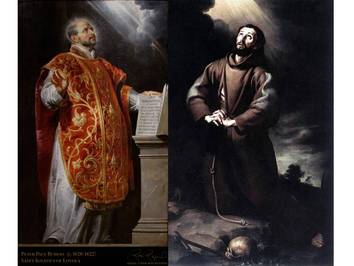 This new pope literally had me at “hello” — unimposing, humble hand wave from the balcony and all. And this humble legacy continues; Pope Francis is turning heads left and right of both the “left” and “right,” consistently shunning the traditional trappings the papacy has offered for hundreds of years. His latest press-stunner: he will not be sleeping in the papal apartments of the Apostolic Palace, but rather in the Vatican guesthouse—a less luxurious living arrangement that puts him in community with those who will be working with and for him. As a Catholic, I’m shocked and amazed. As a Franciscan (and a Capuchin to boot!) I’m humbled and inspired. “He’s out-Franciscan-ing the Franciscans!” I’ve heard people say. And I must agree. This new pope is certainly living up to his namesake—trading the regality and legality of the position and opting for, in my opinion, something a little more expected of a “servant of servants.” Fortunately for us “fledgling Franciscans” in studies, we are being given a great example from our new leader. I’m not lying when I say that this pope has made me reflect on my own life of simplicity and ask some tough questions that I can’t necessarily provide ready answers for at the moment. This is how I know when someone is dripping with authenticity: when the example they give calls my own integrity into question. I just didn’t think it would be a Jesuit that would do it! I have to remind myself that while this pope chose the name Francis (and is living up to the title!), his colors as a Jesuit are shining more true than ever. My experiences with Jesuits are limited, but what I have experienced has been nothing short of impressive. The Jesuits of St. Joseph’s University in Philadelphia heard my confessions as a bright-eyed Capuchin postulant with utter compassion and sensitivity. The Jesuit Retreat House in Parma, Ohio have led myself and thousands of others on spiritual journeys through retreats and programs—sharing with the Church the wealth of Jesuit spirituality and discernment. My uncles and cousins who were educated by them in Toledo, Ohio boast of their Jesuit education with a glowing pride, as I’m sure others can attest to throughout the United States in the plethora of Jesuit institutions of learning. Their missionary zeal speaks for itself in their martyrology. It’s a life given over in love for the sake of the people. Needless to say, these men are made of the stuff of saints—and I constantly remind myself that I’m selling this guy short when I boast of his Franciscan spirit and put aside his life-long service and evangelical influence as a faithful Jesuit. Our new pope bears the name Francis, loves the poor, lives simply and humbly, and upholds the teachings of the Church—and every one of these decisions of his grow fruitfully, no doubt, from a life given to Christ and His Church in the Jesuit tradition. This pope has, ironically, helped me realize less of what separates Francis of Assisi and Ignatius of Loyola and more of what they have in common: a burning desire to serve the poor of this world in charity and humility. Who could have figured that it would take a Jesuit to show me how to be a real Franciscan! Brother Brian Stacy, O.F.M. Cap. is a Capuchin Franciscan from the St. Augustine Province and is currently studying at The Catholic University of America.
Recently, Michael Jordan quietly turned 50. As analysts, old teammates and competitors remember the dominant player he was (or, perhaps, is), they will undoubtedly discuss his dominant playing style, his unrelenting drive and his inhuman ability to constantly sink game winning jump shots. All these aside, though, as the greatest player to ever play the game, Michael’s legacy is founded in his constant desire to better himself and his teammates. Of course, with a résumé that includes 6 NBA championships, 2 Olympic Gold medals and an NCAA Title, it is unsurprising that his image has been found hanging in the bedrooms and gyms of aspiring kids across the country. I don’t know about you, but there is just something about seeing him dunk over Patrick Ewing that makes me want to work on my own game.
In fact, I would be so bold as to say that Michael’s contributions to the game has caused a multitude of kids to want to be “like Mike”. We all need role models and Michael Jordan has certainly been that for countless children. His iconic status has surely inspired greatness in those who have looked up to him. He remains the criterion to which all new basketball stars are compared. David Beckham, the international soccer star wears a number 23 jersey in honor of Jordan. For those Space Jam fans out there, he even inspired Bugs Bunny and the “ToonSquad” to upset the “Monstars.” That being said, while I admire what Michael has done for the game and for children in need of a strong male figure, it begs the question of why we don’t promote our own icons… The Saints If Michael Jordan can find his way into the aspirational imagination of a young ballplayer in the form of a poster, why can’t St. Francis do the same? I’ve heard plenty of young people say they want to be like Michael Jordan, Abby Wambach or Peyton Manning when they grow up. I’ve heard adolescents speak of their admiration for Dr. King, Nelson Mandela or ABC. What I’ve not heard is the following, “I want to be just like St. Benedict when I grow up,” or “When I’m older, I want to be just like Elizabeth Ann Seton.” The church’s rich history of iconography has had the market on bedroom décor long before “Fathead.com” has. Our icons draw us into meditation on the life of each particular saint, thereby inspiring the same greatness in each of us. Jordan’s Game 6 jump shot certainly inspires me to keep my calm and focus, regardless of how the cards are stacked, but my icon of St. Patrick inspires me to bring the Gospel to where it is so desperately needed. The poster I had of Roger Bannister reminded me that no barrier was out of reach, even a sub-four-minute mile, but my icon of St. George reminds me that running a four-minute mile is nothing if you aren’t doing it for the Lord. Often I am reluctant to aspire for sainthood. Looking at my life and all its faults, I feel that sainthood is not only out of reach, but foolish to even hope for. St. Ignatius, though, who’s icon hangs in my office, reminds me that if one aspires for sainthood, just as he did, sainthood will indeed be granted. Casting aside worldly fame, St. Ignatius constantly looked to the saints to inspire him to saintly holiness. Who’s image hangs in your room and what are they inspiring you to do? Standing only 5’7’’, I know that a life like Michael Jordan’s is well beyond my reach (literally), but I love to run, so Sir Roger Bannister remains a fixture. With the help of God’s grace, I know that sainthood is not beyond my reach either, so St. Patrick, St. George and St. Ignatius hang there as well, reminding me that we are all called to sainthood – shepherds, soldiers, and basketball players, too. Michael Jordan’s legacy has surely impacted me and will continue to do so, but ultimately when I grow up I want to be a saint. Patrick J. Sullivan is working on his MA in theology at the University of Notre Dame through the Echo Faith Formation Leadership Program and is currently serving in the Archdiocese of Indianapolis. Today marks the 8th anniversary of Bl. John Paul II death. He was a man who proclaimed Christ triumphant victory over death with great zeal. This day, as we pray for his intercession, let us mediate on his words on the Risen Christ that he shared on Easter Sunday, April 23, 2000.
'O death, where is your sting?' (1 Cor 15:55) "Mors et vita duello conflixere mirando . . ." "Death and life have contended in that stupendous combat: The Prince of life, who died, reigns immortal" (Easter Sequence). Once again, today, the whole Church pauses in amazement at the empty tomb. Like Mary Magdalen and the other women, who came to anoint with spices the body of the Crucified One, like the Apostles Peter and John who came running at the word of the women, the Church bows before the tomb in which her Lord was placed after the crucifixion. A month ago, as a pilgrim in the Holy Land, I had the grace of kneeling before the stone slab which marks the place of Jesus' burial. Today, Easter Sunday, I make my own the proclamation of the heavenly messenger: "He is risen, he is not here" (Mk 16:6). Yes, life and death were locked in combat and Life was victorious for ever. All is once again oriented to life, to Eternal Life! "Victimae paschali laudes immolent christiani . . ." "Christians, to the Paschal Victim offer sacrifice and praise. The sheep are ransomed by the Lamb; and Christ, the undefiled, has sinners to his Father reconciled". The words of the Easter Sequence marvellously express the mystery accomplished in Christ's Passover. They point to the power of renewal flowing from his Resurrection. With the weapons of love, God has defeated sin and death. The Eternal Son, who emptied himself to become the obedient servant to the point of dying on the Cross (cf. Phil 2:7-8), has conquered evil at its roots by opening to contrite hearts the path of return to the Father. He is the Gate of Life who at Easter overcomes the gates of hell. He is the Door of salvation, opened wide for all, the Door of divine mercy, who sheds a new light on human existence. The Risen Christ signals the paths of hope along which we can advance together towards a world more just and mutually supportive, in which the blind egoism of the few will not prevail over the cries of pain of the many, reducing entire peoples to conditions of degrading misery. May the message of life proclaimed by the angel near the stone rolled back from the tomb overturn the hardness of our hearts; may it lead to removing unjustified barriers and promote a fruitful exchange between peoples and cultures. May the image of the new man, shining on the face of Christ, cause everyone to acknowledge the inalienable value of human life; may it encourage effective responses to the increasingly felt demand for justice and equal opportunity in all areas of society; may it impel individuals and States to full respect for the essential and authentic rights rooted in the very nature of the human person. Lord Jesus, our Peace (Eph 2:14), Word made flesh two thousand years ago, who by rising from the dead have conquered evil and sin, grant the human family of the third millennium a just and lasting peace; bring to a happy outcome the talks undertaken by people of good will who, despite so many doubts and difficulties, are trying to bring an end to the troubling conflicts in Africa, the armed clashes in some countries of Latin America, the persistent tensions affecting the Middle East, vast areas of Asia, and some parts of Europe. Help the nations to overcome old and new rivalries, by rejecting attitudes of racism and xenophobia. May the whole of creation, inundated by the splendour of the Resurrection, rejoice because "the brightness of the eternal King has vanquished the darkness of the world" (Easter Proclamation). Yes, Christ has risen victorious, and has offered man, Adam's heir in sin and death, a new heritage of life and glory "Ubi est mors stimulus tuus?". "O death, where is your sting?" (1 Cor 15:55), exclaims the Apostle Paul, touched on the road to Damascus by the light of the Risen Christ. His cry echoes down the centuries as the proclamation of life for the whole of human civilization. We too, the men and women of the twenty-first century, are invited to be mindful of this victory of Christ over death, revealed to the women of Jerusalem and the Apostles, when they arrived hesitantly at the tomb. Through the Church, the experience of these eye-witnesses has come down to us too. It is a significant part of the journey of the pilgrims who, during this Year of the Great Jubilee, are entering through the Holy Door, and going away with renewed courage to build pathways of reconciliation with God and with their brothers and sisters. At the heart of this Year of grace, may the proclamation of Christ's followers be heard more loudly and clearly, a joint proclamation, beyond all divisions, in ardent longing for full communion: "Scimus Christum surrexisse a mortuis vere". "Yes, that Christ is truly risen from the dead we know, Victorious King, your mercy show!" Amen URBI et ORBI Message of His Holiness Pope John Paul II |
Details
Archives
July 2024
Categories
All
|
About |
Media |
© COPYRIGHT 2024 | ALL RIGHTS RESERVED



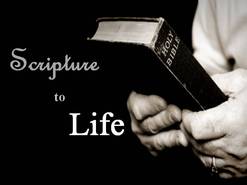
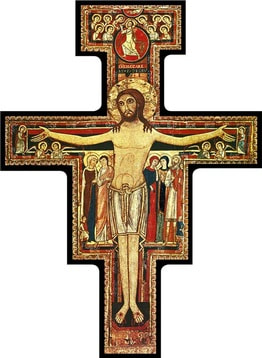
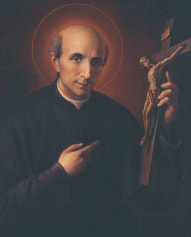

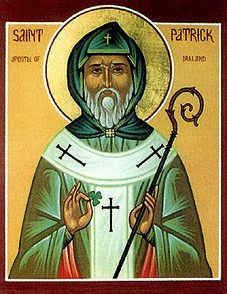
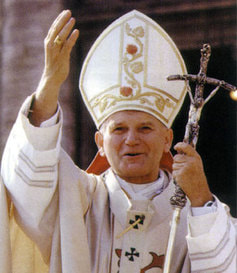
 RSS Feed
RSS Feed